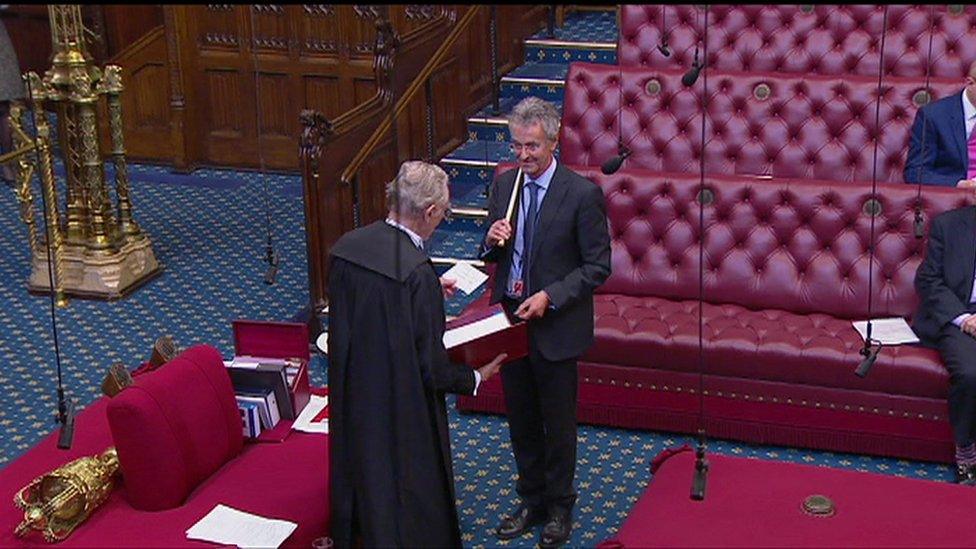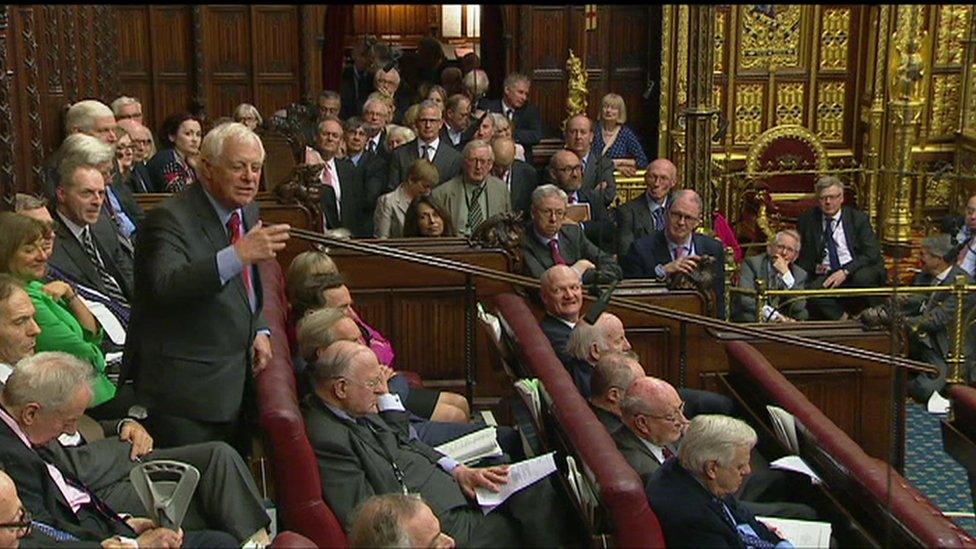The scale of what's happened in the Brexit bill
- Published
- comments

The 15th government defeat on the EU Withdrawal Bill came at third reading
It is worth taking a moment to ponder the scale of what has happened in the House of Lords over the last few weeks.
At times it has seemed a near rout.
The government was defeated in 15 Lords votes on the EU (Withdrawal) Bill, external, its keystone Brexit legislation, with majorities against it ranging from 24, to 128. One imagines the laconic call from the Leader of the Lords Office: "Downing St, we have a problem…"
The problem is not so much that a number of Conservatives voted against the government - in fact, rebel Tory votes tipped the balance only once, in the unusual circumstances of the multiple rebellion on the European Economic Area amendment, external - or even that rather more Conservative peers didn't vote at all, because the government whips managed to bring in more than usual.
The problem is that the overlapping causes of Soft Brexit and No Brexit command the support of a comfortable majority of peers - and short of a Tony Benn-style mass creation of new Brexiteer peers, that is going to remain an uncomfortable fact of life for ministers.
Uncomfortable, because there is plenty more Brexit legislation in the pipeline, and more still that be fed into Parliament. (We're nowhere near seeing an immigration bill, but a measure to set up a post Brexit immigration regime will clearly be needed, and it is a fair bet that their lordships will take a lively interest in its content.)
Mobilised majority
There is a majority there in the Lords to be mobilised, and the Labour and Lib Dem leaderships have become adept at mobilising it.

Lord Patten was one of the most vocal rebels during the passage of the Brexit bill
Indeed, the amazing vote on Lord Alli's European Economic Area amendment, last week, demonstrates that it can be mobilised even when the Labour Whips don't throw their backing behind it.
On that occasion 84 Labour peers defied instructions to abstain, and teamed up with the Lib Dems, 50 Crossbenchers and a crucial 17 Conservatives, to win that amendment. Linger a moment over the list of Labour "rebels"; former Leader Neil Kinnock, former cabinet ministers, two former chairs of the Parliamentary Labour Party and a former Commons Chief Whip. (The latter, Baroness Armstrong, will have been in good company, as she was joined in the lobby by Lord Arbuthnot, a former Tory Chief Whip, making his debut as a rebel.)
The Tory rebels were mostly fairly predictable. The hard core of europhile 1980s cabinet ministers were there - Heseltine, Hailsham, Patten - but it is also worth noting the smattering of Cameron appointees who were there as well - Baroness Altmann, Baroness Wheatcroft , Baroness Verma, Lord Green of Hurstpierpoint, Lord Cooper of Windrush, Lord Prior of Brampton.
Is this evidence that Cameroon Tories can no longer be relied upon by Theresa May?
Why does it matter?
All this matters because, as I say, the government has plenty more Brexit legislation to get through Parliament, and the House of Lords will clearly be a considerable obstacle.
There is the usual chuntering about unelected peers, but I doubt the government has the votes to push through constitutional reforms to clip their wings, any more than it has the votes to block some of those amendments to the EU Withdrawal Bill.
So the government maintains the holding position that it is considering the amendments from peers - and in fairness it would not normally bring them back to the Commons within days of the Lords third reading - but the consideration could go on for quite a while.
And if the Commons does vote to, in effect, throw out the government's Brexit policy, what then?